The AMD Ryzen 5 1600X vs Core i5 Review: Twelve Threads vs Four at $250
by Ian Cutress on April 11, 2017 9:00 AM ESTGPU Tests: Civilization 6 (1080p, 4K)
First up in our CPU gaming tests is Civilization 6. Originally penned by Sid Meier and his team, the Civ series of turn-based strategy games are a cult classic, and many an excuse for an all-nighter trying to get Gandhi to declare war on you due to an integer overflow. Truth be told I never actually played the first version, but every edition from the second to the sixth, including the fifth as voiced by the late Leonard Nimoy, it a game that is easy to pick up, but hard to master.
Benchmarking Civilization has always been somewhat of an oxymoron – for a turn based strategy game, the frame rate is not necessarily the important thing here and even in the right mood, something as low as 5 frames per second can be enough. With Civilization 6 however, Firaxis went hardcore on visual fidelity, trying to pull you into the game. As a result, Civilization can taxing on graphics and CPUs as we crank up the details, especially in DirectX 12.
Perhaps a more poignant benchmark would be during the late game, when in the older versions of Civilization it could take 20 minutes to cycle around the AI players before the human regained control. The new version of Civilization has an integrated ‘AI Benchmark’, although it is not currently part of our benchmark portfolio yet, due to technical reasons which we are trying to solve. Instead, we run the graphics test, which provides an example of a mid-game setup at our settings.
At both 1920x1080 and 4K resolutions, we run the same settings. Civilization 6 has sliders for MSAA, Performance Impact and Memory Impact. The latter two refer to detail and texture size respectively, and are rated between 0 (lowest) to 5 (extreme). We run our Civ6 benchmark in position four for performance (ultra) and 0 on memory, with MSAA set to 2x.
For reviews where we include 8K and 16K benchmarks (Civ6 allows us to benchmark extreme resolutions on any monitor) on our GTX 1080, we run the 8K tests similar to the 4K tests, but the 16K tests are set to the lowest option for Performance.
MSI GTX 1080 at 1920x1080

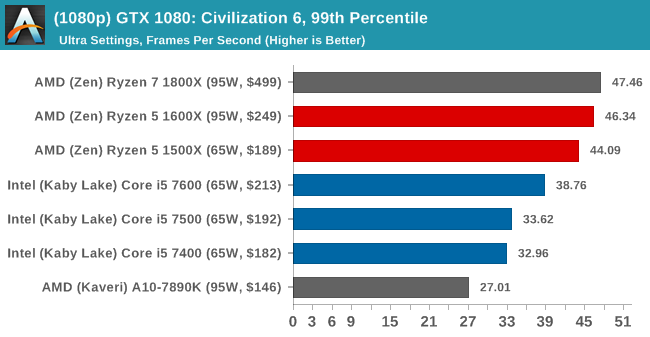
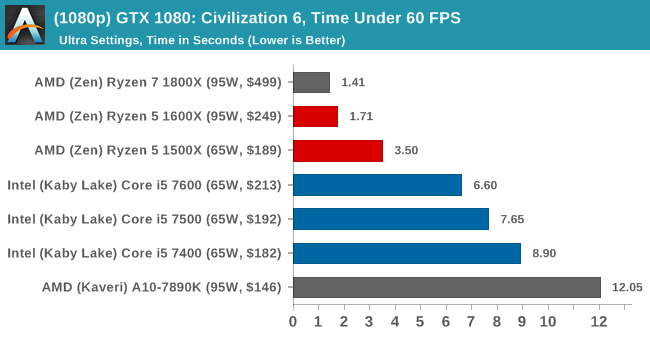
MSI GTX 1080 at 4K
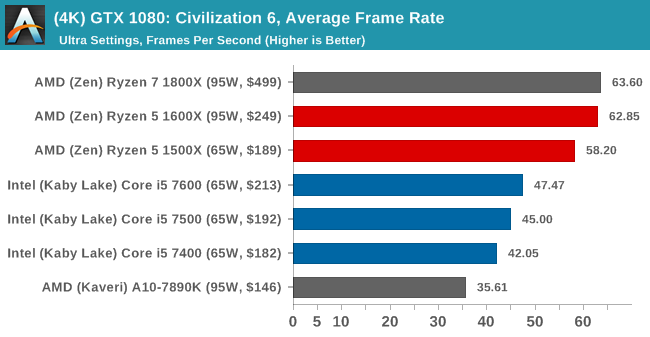
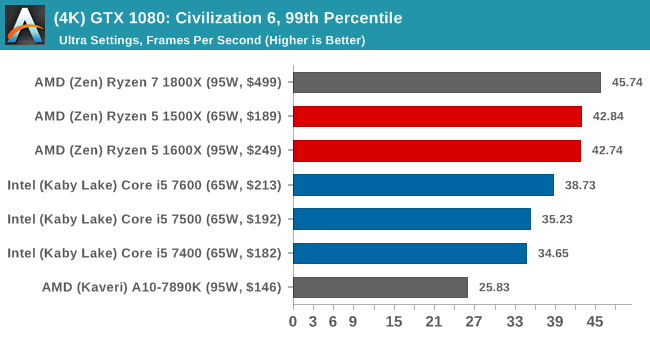 >
>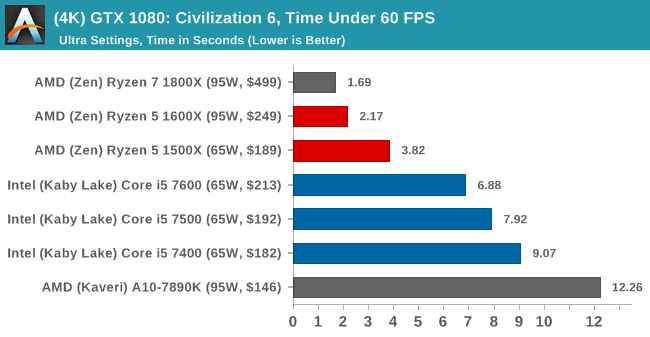
ASUS GTX 1060 at 1920x1080
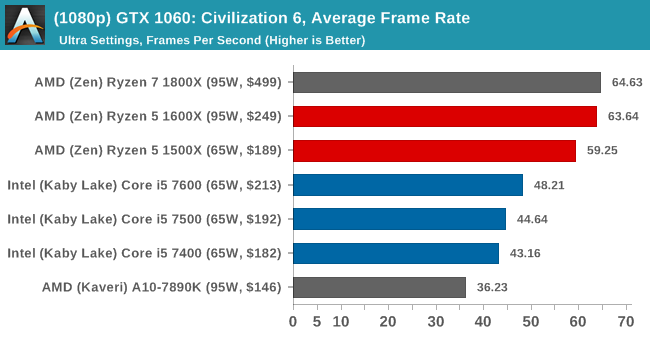
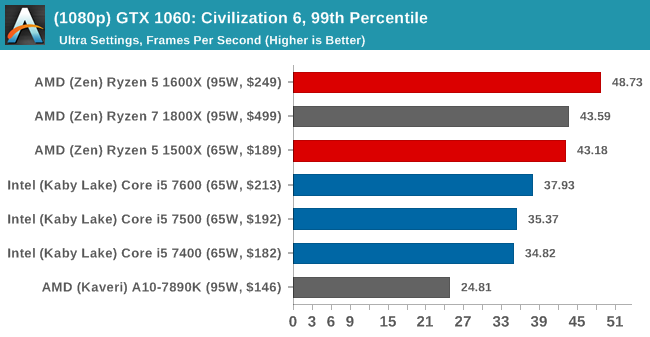
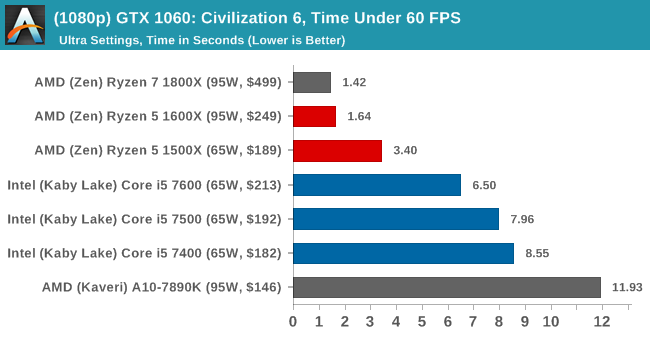
ASUS GTX 1060 at 4K
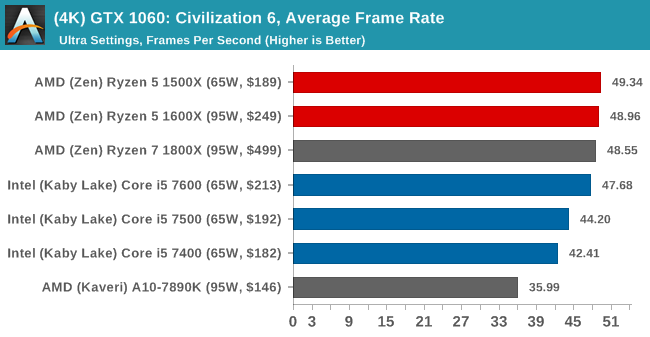
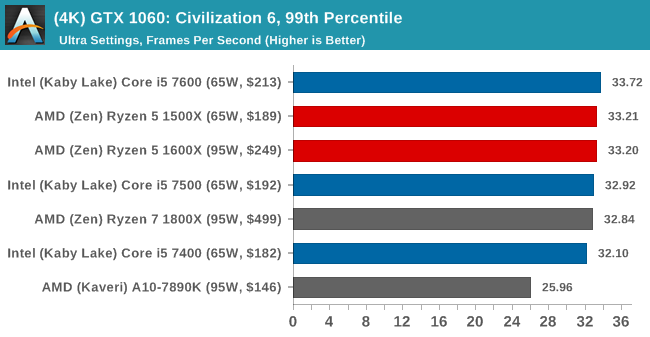
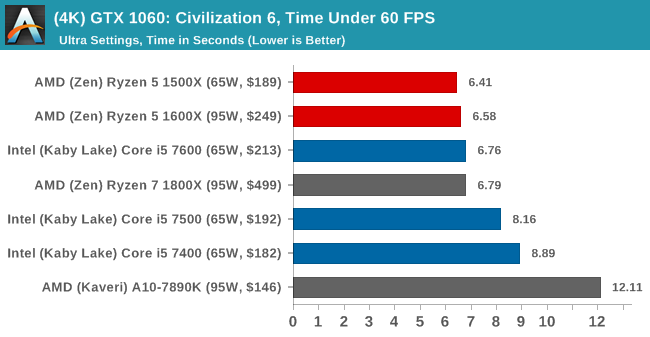
Sapphire R9 Fury at 1920x1080
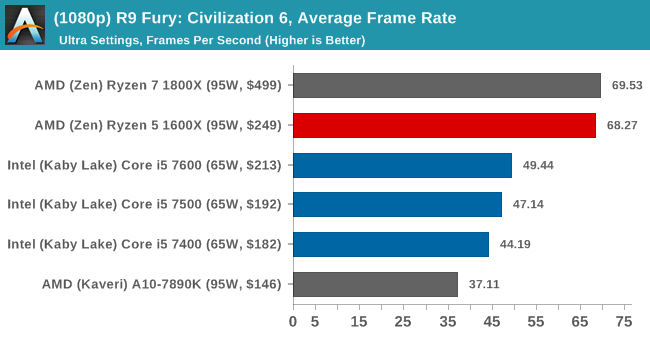
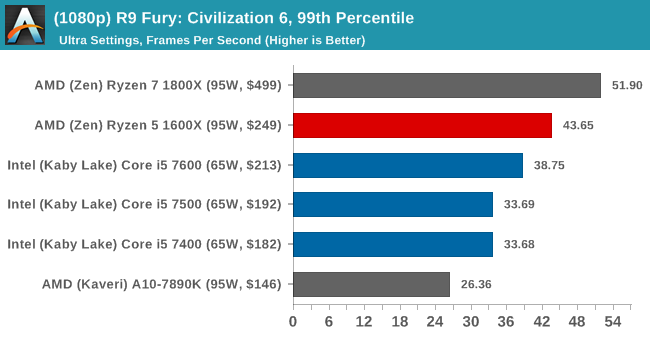
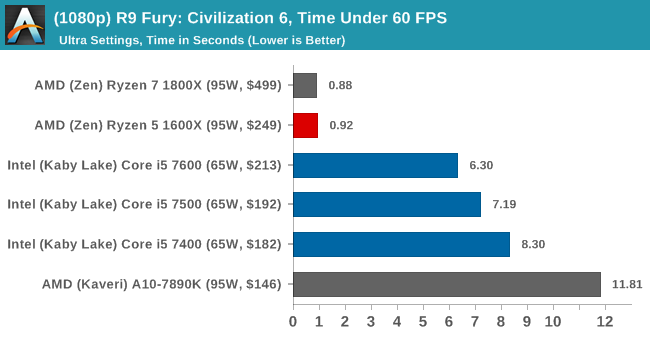
Sapphire R9 Fury at 4K
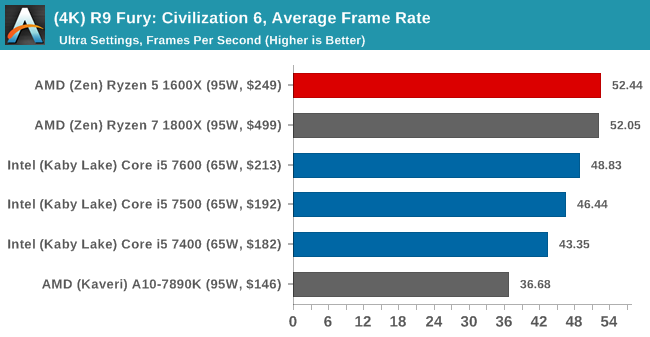
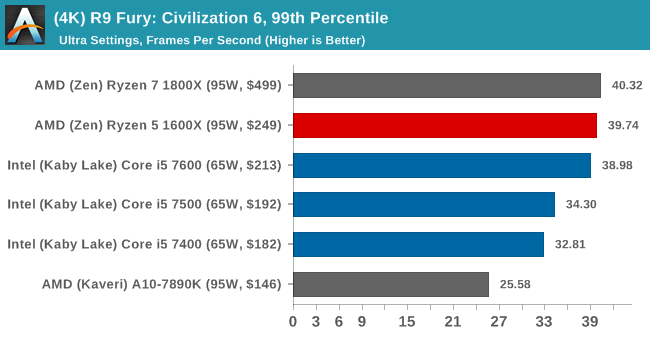
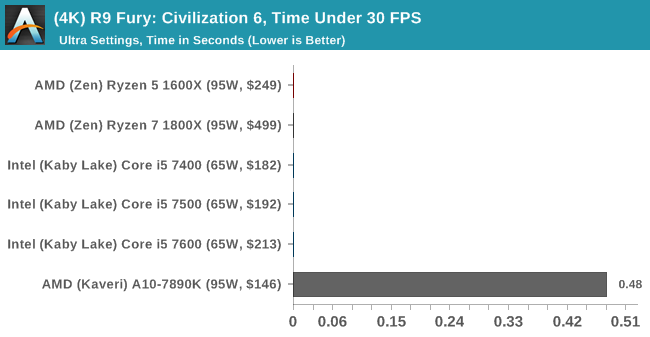
Sapphire RX 480 at 1920x1080
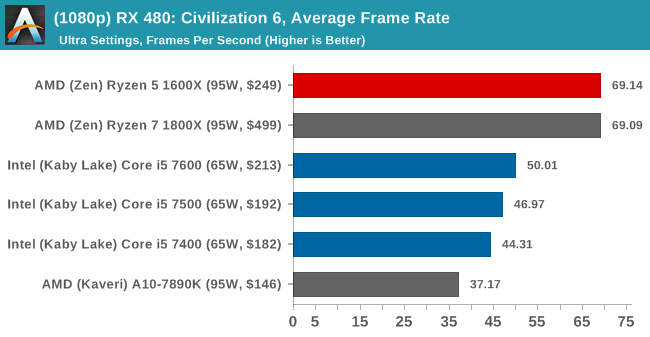
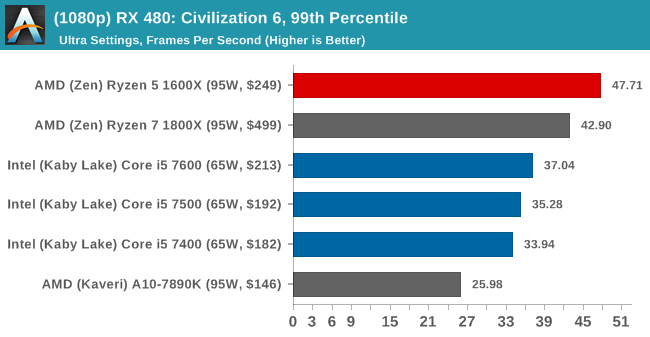
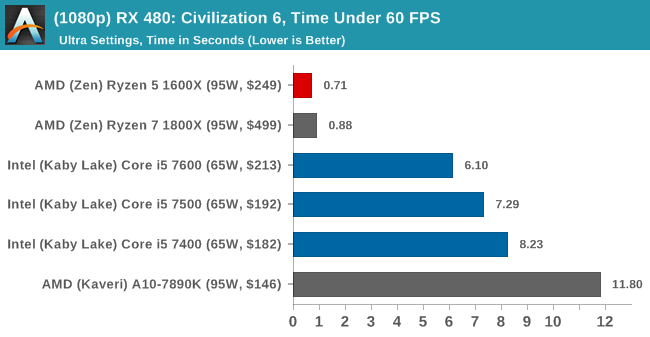
Sapphire RX 480 at 4K
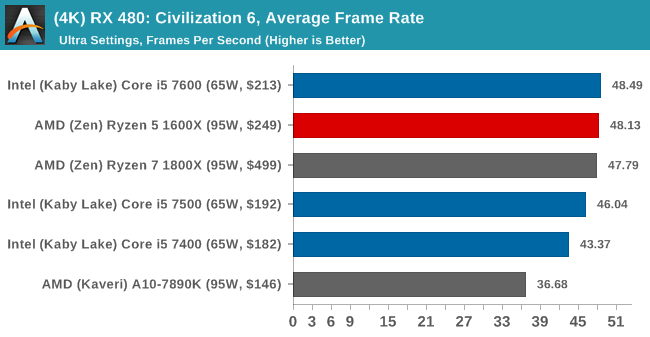
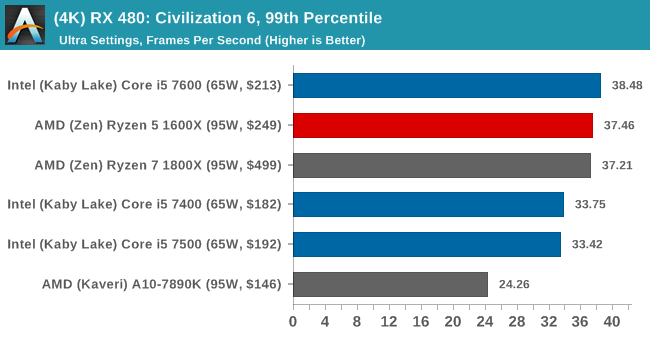
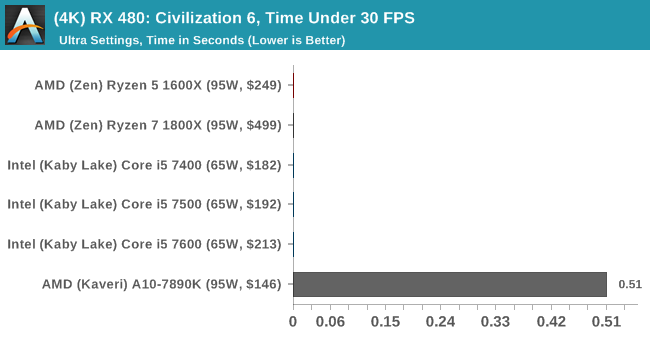



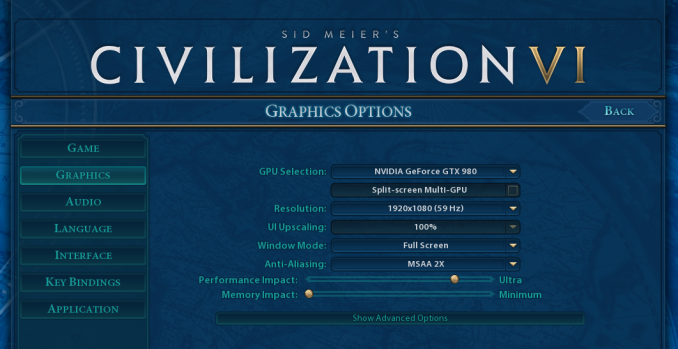








254 Comments
View All Comments
msroadkill612 - Thursday, April 13, 2017 - link
Its worth noting that amd moboS historically tend to endure many revised cpuS. whereas an intel cpu upgrade for a user is bound to require a new mobo."ryzen 2" will probably simply drop into an am4 mobo.
Its also interesting that many or all the mobos i have seen are ready to go for an apu - video connects onboard e.g.
this indicates that raven ridge exists now, for pre-production mobo testing.
msroadkill612 - Thursday, April 13, 2017 - link
I dont believe amd would go to all the trouble of doing zen and vega, and then merge zen with prev gen polaris for the APU.it doesnt make sense from several perspectives. amd philosophy, the architecture seen in ryzen - 2 zen core blocks on a ccx simply becomes one core block and one vega gpu on a single ccx.
it will be a hell of a piece of silicon.
Johan Steyn - Friday, April 14, 2017 - link
Ryzen 9 is not that far fetched. Looking at the server part coming soon, an Ryzen extreme could be happening, especially for workstations. Maybe it might even fit AM4, although unlikely with quad channels. I do not think the current SOC has enough pins. So maybe we might get a Ryzen 9 with plenty of cores and quad channel memory.drajitshnew - Friday, April 14, 2017 - link
Dear Ian,Please clarify a point. You have mentioned that both AMD & Intel have 16 CPU PCIe lanes, but AMD offers 4 pcie lanes for storage from the CPU. If the chipset is loaded this could have an impact on the following 3 situations,
1. If the motherboard manufacturer routes those lanes from m2 to PCIe. Then those could be used, as storage, adding a GPU for GPGPU or a 10GbE NIC for use for a UHD media server, or AIC format storage.
2. With a heavily loaded chipset, a NVMe drive like a 1 TB samsung 960 pro or comparable, may show improved performance, specially in sequential transfers.
3. For a long lived system a large X-point or Z-nand or 3d SLC may show significant latency advantages.
cvearl - Sunday, April 16, 2017 - link
You have odd 480 results on GTA V. Are you using the final run (with the jet) from the built in test? My 480 scores in the mid 70's using your settings on that run with an i7 2600k.cvearl - Sunday, April 16, 2017 - link
Looking back at my GTX 1060 SC results (before I replaced with my 480) It had similar results to what you show here (Assuming the final run of the built in test). Am I to understand that the 480 gets a better result on i7 than Ryzen?Polacott - Monday, April 17, 2017 - link
my experience with AMD processors is that they have aged perfectly. I mean the AMD processors got more support and performance as apps and SO has been prepared to take advantage of more threads as years passed. I would get the Ryzen 1600X without any doubts over the i5.rmlarsen - Monday, April 17, 2017 - link
Unfortunate typo: In the conclusion it says "Looking at the results, it’s hard to notice the effect that 12 threads has on multithreaded CPU tests. " I believe the author meant to write "it's hard NOT to notice".Kamgusta - Tuesday, April 18, 2017 - link
Why in the Earth nobody ever considers the i7-7700?!?! And keep on putting the Ryzen CPUs only against the i5-7600K and/or the i7-7700K?i7-7700 has the same clocks as the i5-7600K, but double the threads and 2MB more L3. It consumes a lot less power than the i7-7700K and no more power than the i5-7600K. You can picture it as a more powerful i5-7600K or as a slight less powerful i7-7700K (but far more efficient).
If anyone is torn between R6-1600 and i5-7600K then the i7-7700 is, quite ironically, the best choice.
Ratman6161 - Tuesday, April 18, 2017 - link
So over the weekend I upgraded my system from an i72600K to a Ryzen 5 1600. First off, I could care less about gaming so I'll put that out there up front. I can buy (in order of real world price)i7 7700K for $300
ryzen 1600x would have been $249
Ryzen 5 1600 was $219
i5 7600K for $210.
I went with the R5 1600. For highly multi threaded tasks (remembering I don't care anything about games about games) the six core R5's compare very favorably with the i7 7700K even though most of the comparisons you see match them up against the i5. And the big difference between the 1600 and the 1600X is clock speed...and they are unlocked. So for me the 1600 ended up being a no-brainer.
So for us non-gamers anyway, i'd disagree with the i7 7700K being the best choice.
Also, when comparing prices, look at the platform price including motherboards. I got an Asrock AB350 Pro 4 for $39 bundled with the CPU so total price $258. Cheapest 7600K bundle at the same place: $315, cheapest 7700K bundle $465.